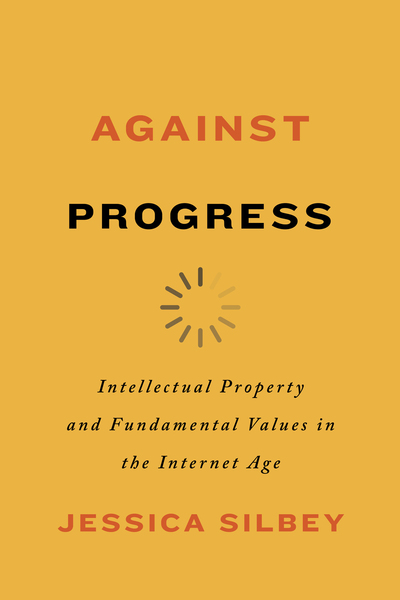
June 2022
448 pages.
from $30.00
Paperback now $15.00 (50% off)
Hardcover ISBN: 9781503608306
Paperback ISBN: 9781503631915
Ebook ISBN: 9781503631922
Finalist of the 2023 PROSE Award in the Legal Studies and Criminology Category, sponsored by the Professional and Scholarly Publishing Division, Association of American Publishers.
When first written into the Constitution, intellectual property aimed to facilitate "progress of science and the useful arts" by granting rights to authors and inventors. Today, when rapid technological evolution accompanies growing wealth inequality and political and social divisiveness, the constitutional goal of "progress" may pertain to more basic, human values, redirecting IP's emphasis to the commonweal instead of private interests. Against Progress considers contemporary debates about intellectual property law as concerning the relationship between the constitutional mandate of progress and fundamental values, such as equality, privacy, and distributive justice, that are increasingly challenged in today's internet age. Following a legal analysis of various intellectual property court cases, Jessica Silbey examines the experiences of everyday creators and innovators navigating ownership, sharing, and sustainability within the internet eco-system and current IP laws. Crucially, the book encourages refiguring the substance of "progress" and the function of intellectual property in terms that demonstrate the urgency of art and science to social justice today.
About the author
Jessica Silbey is Professor of Law at the Boston University School of Law. She is the author of The Eureka Myth: Creators, Innovators, and Everyday Intellectual Property (Stanford, 2015), and was a Guggenheim Fellow in 2018.
"Against Progress is a satisfying, witty, and altogether magnificent provocation about the ethical limits of owning ideas. What happens when 'the road to progress' (which patent, intellectual property, and trademark laws are supposed to sustain) becomes littered with privatized toll booths and heavy fines? What happens when the right to profit from one's creativity hardens into an extractive vise so overreaching that it stifles broad economies of knowledge production? Most importantly, what happens when the internet's pyrrhic gift of viral reproductibility enables vast abuses of power, outright theft, and the widespread impoverishment of musicians, artists, writers, inventors? Jessica Silbey's brilliant book reanimates the values and virtues that once informed this legal arena: fairness, honesty, civic empathy, restraint, and the world-building sociality of shared creative enterprise."
—Patricia J. Williams, Northeastern University
"Against Progress announces a timely and needful reorientation of intellectual property scholarship in North America, insisting on democracy, rather than efficiency, as the organizing conceptual principle, offering an unusually insightful and revitalizing translation of efficiency into otherwise latent social justice concerns, and thus of narrowly framed economic issues into vivid dialogues and contestations about political culture. A remarkable work."
—Abraham Drassinower, University of Toronto
"I have long thought that we as IP lawyers would do well to listen to the voices of creators—especially when those creators are not clients of ours. Against Progress does a fantastic job of letting those creators express, in their own voices, the struggles they face trying to adapt their professional lives to a changing technological environment. Kudos to Silbey for letting their voices be heard, framed by high-level legal discussion of whether our IP laws are doing the work of advancing progress—or pushing back on it."
—Gaston Kroub, Above the Law
"[Silbey's] book is well-researched and organized and includes an excellent analysis of traditional IP case law and interviews with more than 100 real-world creators about how they navigate the IP law system.... This is an important read for anyone interested in the shifting policies surrounding IP law. Recommended."
—J. D. Graveline, CHOICE